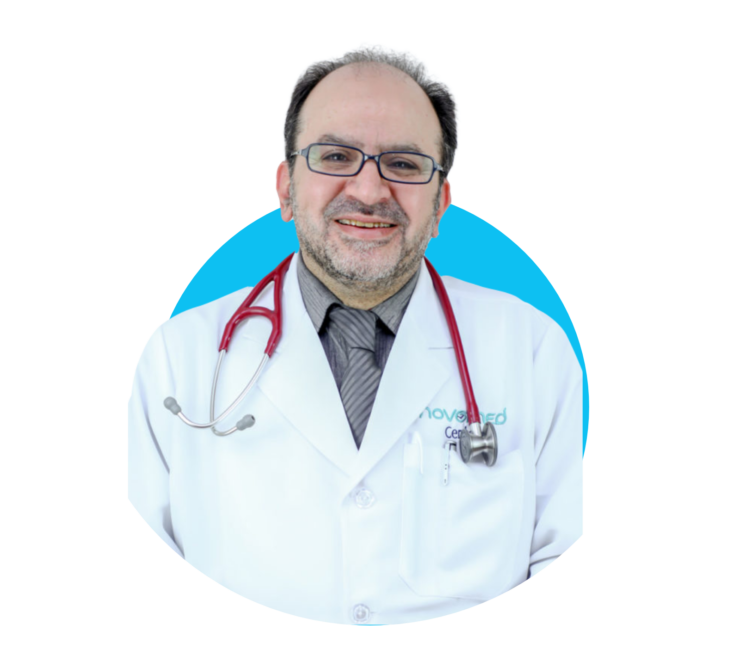Endocrinologist in Dubai, Abu Dhabi and Al Ain
Our endocrinologists at Novomed specialize in the diagnosis and treatment of endocrine disorders, including thyroid disease, diabetes, adrenal gland disorders, pituitary disease and others. They also have expertise in the diagnosis and management of chronic fatigue syndrome and its endocrine interactions. They believe in a holistic approach to their patients, offering a long initial consultation that allows sufficient time to discuss all concerns.
The endocrine system consists of the glands that regulate body functions, such as growth, metabolism and sexual development, by producing carefully balanced amounts of hormones. Producing too much or too little hormones can affect the body and cause different endocrine disorders.
At Novomed, we can help you with any health conditions relating to the excessive or insufficient production of hormones, otherwise known as endocrine conditions. You will be taken care of by a team of physicians who are highly experienced in the diagnosis and treatment of both common and complex hormonal problems. Our endocrinology clinic has state-of-the-art equipment to provide accurate diagnosis and optimal treatment of thyroid, parathyroid, adrenal and pituitary conditions.
When you visit Novomed, our specialist endocrinologist will review your medical history, discuss your symptoms, run lab tests to reach a diagnosis for your endocrine condition. After that, they will work with a multi-disciplinary team to create a care plan tailored to your individual needs. Our team will discuss all your options and ensure that all your questions or concerns have been addressed.
Our Focus Areas
- Diabetes mellitus, including neuropathy and insulin resistance
- Obesity management
- Calcium and bone metabolism disorders
- Hypercalcemia
- Lipid abnormalities
- Pituitary diseases
- Thyroid disorders
- Thyroid nodules
The endocrine system is the group of glands that produce and secrete hormones to regulate the body’s growth and development, metabolism, reproduction, sexual function, tissue function, sleep, mood, and so on. The endocrine glands include:
- The adrenal glands secrete hormones like cortisol (to regulate your metabolism and control your body’s response to stress) and adrenaline (to help you react to stress).
- The hypothalamus maintains homeostasis (the body’s internal balance) and serves as the link between the endocrine and nervous systems.
- The pancreas has islet cells cells to control the secretion of insulin and glucagon.
- The ovaries produce sex hormones, notably estrogen and progesterone, which are essential to normal reproductive development and fertility.
- The parathyroid controls the body’s calcium and plays a role in bone development.
- The pineal gland synthesizes and secretes melatonin, which is linked to sleep patterns and the regulation of reproductive hormones.
- The pituitary is often referred to as the ‘master gland’ because it influences many other glands, especially the thyroid.
- The testes produce sperm and sex hormones.
- The thymus helps develop the body’s immune system early in life.
- The thyroid regulates the body’s vital functions and controls metabolism.
Broadly speaking, gland-related disorders fall into two categories:
- The gland secretes too much or too little of a hormone
- The gland has benign or malignant tumors
Well-known endocrine disorders include:
Diabetes mellitus (including type 1, type 2 and gestational) is the most common endocrine disorder and caused by the body not producing enough of the hormone insulin, or the body being resistant to insulin, or both.
Hyperthyroidism, where too much of the thyroid hormone is produced, can lead to increased heart rate, weight loss, sweating, and nervousness. The most common cause is Grave’s disease, an autoimmune disorder.
Hypothyroidism, where too little of the thyroid hormone is produced, can lead to depression, constipation, fatigue and dry skin. In children, an underactive gland can result in delayed development.
Polycystic ovary syndrome (PCOS), a major cause of infertility, is often linked to overproduction of androgen hormones. This interferes with the development and release of a woman’s eggs.
Common symptoms among the different endocrine disorders are weakness and fatigue, occurring alongside disease-specific symptoms.
In addition to taking a thorough look at your symptoms and medical history, our endocrinologists have a variety of tests at their disposal to assist in your diagnosis. To check your hormone levels, they can do blood and/or urine tests, or if there is a suspected tumor, imaging tests will be done.
To book an appointment with our endocrinologist or to know more about our services, call us toll-free on 800 (NOVO) 6686 or click the live chat icon at the bottom of the screen.



